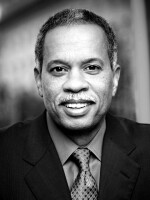ALEX CHADWICK, host:
Juan Williams, NPR news analyst and regular Friday contributor to DAY TO DAY is back with us again. Juan, hello.
JUAN WILLIAMS: Hello, Alex.
CHADWICK: So let me read you what White House spokesman Tony Snow had to say. This is in response to a question from the Associated Press about the apparent discrepancy between Mr. Gonzales' testimony and that of FBI Director Mueller. Tony Snow said flatly: The FBI director did not contradict the testimony. What's going on?
WILLIAMS: This is all a dodge, Alex, and it's, you know, Washington language being used in terms of euphemisms and escape clauses and all the rest. But the fact is that right now you have people on the Hill trying to launch a separate investigation of Gonzales, asking Mueller for his notes, contemporaneous notes at the time of his visit to the hospital. So what we have now is a widening investigation that even the kind of denials coming from the White House can't stop.
CHADWICK: How long do you think Republican lawmakers can continue to back the White House in keeping Attorney General Gonzales in his job, Juan?
WILLIAMS: Alex, there's a divide here in terms of interest and it doesn't break down along party lines. What you have is people like Senator Specter, you know, well respected, someone with great experience on the Judiciary Committee saying that basically the Justice Department is a broken institution with Alberto Gonzales as its leader and it's unable to really not only continue efforts to make sure that there is expansion of intelligence gathering in the face of efforts to thwart terrorists, but the very credibility of the justice system itself is at stake given the problems and issues that have arisen in light of the firing of the prosecutors, the U.S. prosecutors.
The White House interests are altogether on a different side of the world, Alex. They feel that if you have a hearing for a new attorney general, it will raise all sorts of issues and force them to confront questions they don't want to face. Secondly, Fred Fielding, who has been out of the White House counsel, is trying to hold at bay investigators and subpoenas of all manner, and he doesn't want an aggressive Justice Department feeling that they have to prove their credibility to the Congress, you know, sacrificing the White House in the process.
So they don't see that there is - the White House doesn't see if there's any interest in putting someone new in that position while the Congress feels, oh yes, the White House needs to listen to us.
CHADWICK: How about the subpoenas this week from the Senate Judiciary Committee for Karl Rove at the White House to testify about the firings of the U.S. attorneys?
WILLIAMS: This is all part of the same story, and you know, the White House, of course, has turned down subpoenas and said that they don't want to deal with subpoenas for any of their officials, claiming executive privilege. And we look to headed towards the court on this and the White House is very confident that they will win in court.
But the whole issue then becomes, again, the White House now versus Republicans and Democrats in Congress who feel that the president has overstepped his bounds on claims of executive privilege, especially when it comes to the firing of the prosecutors, and you come to people like Sarah Taylor, who was the political director under Karl Rove, why she can't testify people are perplexed, and when she did testify recently and claimed the executive privilege direction from the president not to say anything, she then went on to give some answers and so totally bollixed and confused the issue. What can you answer? What can't you answer? And you're only answering when it's in your favor and in protecting the president. There's a great deal of discomfort here and it looks to me like you're going to have to have the court step in.
CHADWICK: Well, at least there's this for the Bush administration. There is some attention this week in Washington and elsewhere to a growing dispute between the two leading Democratic candidates for president: Senators Clinton and Obama. This grew out of a question Monday night at the YouTube-CNN debate. Here's an edited version of the question and the response from the senators.
(Soundbite of debate)
Unidentified Man #1: Would you be willing to meet separately without precondition during the first year of your administration in Washington or anywhere else with the leaders of Iran, Syria, Venezuela, Cuba and North Korea in order to bridge the gap that divides our countries?
Mr. ANDERSON COOPER (Moderator): Senator Obama?
Senator BARACK OBAMA (Democrat, Illinois): I would. And the reason is this, that the notion that somehow not talking to countries is punishment to them, which has been the guiding diplomatic principle of this administration, is ridiculous.
Mr. COOPER: Senator Clinton?
Senator HILLARY CLINTON (Democrat, New York): Well, I will not promise to meet with the leaders of these countries during my first year. I will promise a very vigorous diplomatic effort. Because I think it is not that you promise a meeting at that high a level before you know what the intentions are. I don't want to be used for propaganda purposes.
CHADWICK: And Senator Clinton went on to tell a newspaper in Iowa that Senator Obama's response had been naive and irresponsible.
WILLIAMS: And it gets better, Alex. Then you get this whole notion of - as advanced by Obama - of Hillary Clinton as Bush-Cheney lite, and then Mrs. Clinton coming back and saying what happened to the politics of hope? So this is an ongoing issue.
And I'll tell you why it's so interesting on a political level. Because the effort by Obama initially was one to say I'm fresh, I'm different, I'm not part of the ongoing establishment, you know, the Clintons and then the Bushes and their reluctance to deal with people abroad, with countries that are supposedly part of the axis of evil, our enemies. That was his hope.
Mrs. Clinton struck back in such a way as to highlight Barack Obama as an inexperienced politician, especially in dealing with foreign policy. And in the aftermath, she was so confident that she then went on to speak with a paper in Iowa and say that he was a naïf dealing in dangerous waters. That's what caused Obama then to strike back, and Obama feels that he is getting to Mrs. Clinton's left, which is where he wants to be for the base of the party in a primary election. And again, he's emphasizing that he's different, that he is not the same as Mrs. Clinton.
So he feels he is gaining from this argument. Mrs. Clinton feels she is gaining from the argument, and I think it's likely to continue for that reason.
CHADWICK: NPR News analyst Juan Williams regularly here on Fridays. Juan, thank you again.
WILLIAMS: My pleasure, Alex. Transcript provided by NPR, Copyright NPR.







